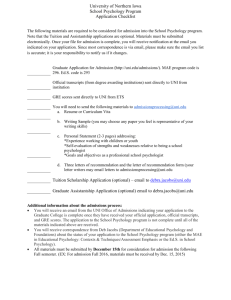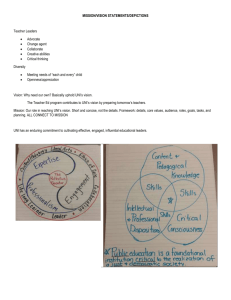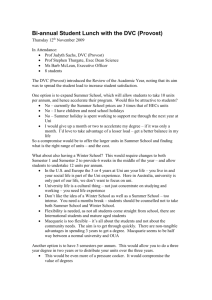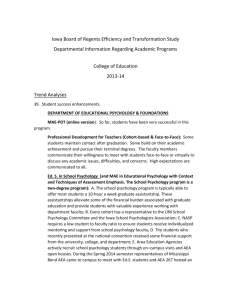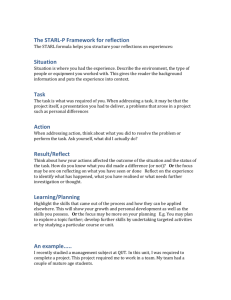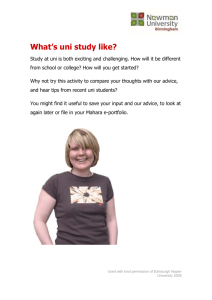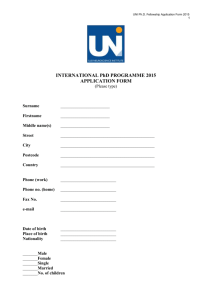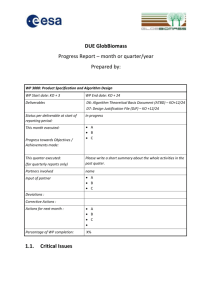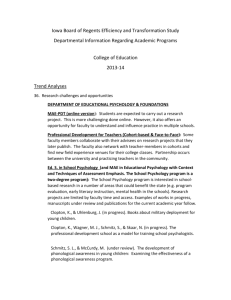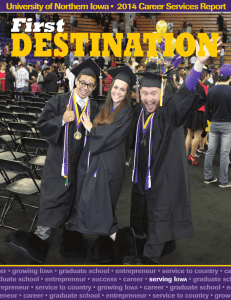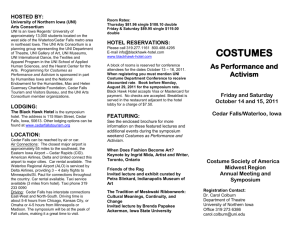35-csbs
advertisement
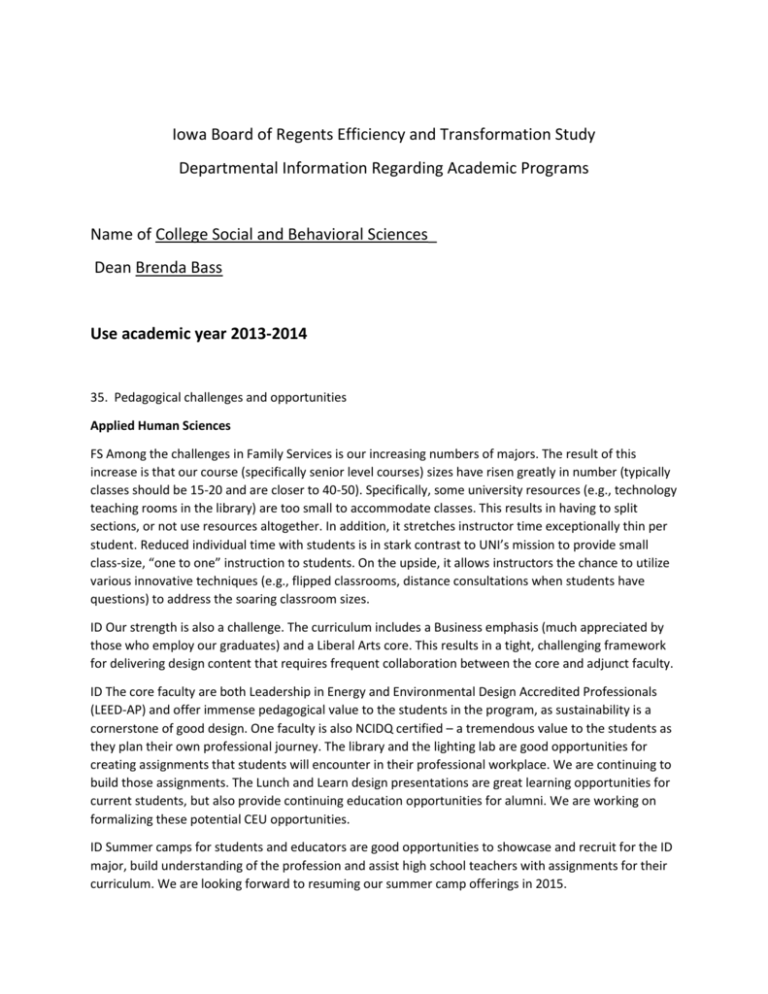
Iowa Board of Regents Efficiency and Transformation Study Departmental Information Regarding Academic Programs Name of College Social and Behavioral Sciences_ Dean Brenda Bass Use academic year 2013-2014 35. Pedagogical challenges and opportunities Applied Human Sciences FS Among the challenges in Family Services is our increasing numbers of majors. The result of this increase is that our course (specifically senior level courses) sizes have risen greatly in number (typically classes should be 15-20 and are closer to 40-50). Specifically, some university resources (e.g., technology teaching rooms in the library) are too small to accommodate classes. This results in having to split sections, or not use resources altogether. In addition, it stretches instructor time exceptionally thin per student. Reduced individual time with students is in stark contrast to UNI’s mission to provide small class-size, “one to one” instruction to students. On the upside, it allows instructors the chance to utilize various innovative techniques (e.g., flipped classrooms, distance consultations when students have questions) to address the soaring classroom sizes. ID Our strength is also a challenge. The curriculum includes a Business emphasis (much appreciated by those who employ our graduates) and a Liberal Arts core. This results in a tight, challenging framework for delivering design content that requires frequent collaboration between the core and adjunct faculty. ID The core faculty are both Leadership in Energy and Environmental Design Accredited Professionals (LEED-AP) and offer immense pedagogical value to the students in the program, as sustainability is a cornerstone of good design. One faculty is also NCIDQ certified – a tremendous value to the students as they plan their own professional journey. The library and the lighting lab are good opportunities for creating assignments that students will encounter in their professional workplace. We are continuing to build those assignments. The Lunch and Learn design presentations are great learning opportunities for current students, but also provide continuing education opportunities for alumni. We are working on formalizing these potential CEU opportunities. ID Summer camps for students and educators are good opportunities to showcase and recruit for the ID major, build understanding of the profession and assist high school teachers with assignments for their curriculum. We are looking forward to resuming our summer camp offerings in 2015. COUN Integration of technology tools into the coursework in such a way that the program stays abreast of the current trends in the field without diluting or diminishing the quality of training. Geography We have an opportunity is to reinforce our position as the leading program in GISc in the region. We have the only bachelor’s degree in GISc in the region and our undergraduates are better and more broadly trained than at any other institution in the Midwest. This quality and advanced training along with our applied, workforce oriented approach, has made us the premier destination for community college articulation. Furthermore, our efforts in outreach through the GeoTREE center has made UNI the recognized leader in applied GIS among public and private employers. Leveraging those assets presents an opportunity to further solidify UNI as the leading university for applied GIS and GIS workforce development. Another opportunity we have embraced is through the National Science Foundation Research Experience for Undergraduates (NSF-REU) grant our department holds. The NSF-REU program offers an 8-week course in hyperspectral remote sensing and brings student from other Iowa universities and from across the county to UNI to learn cutting-edge technologies, methods, and applications. The NSFREU program strongly reinforces UNI’s status as the premier and most advanced GIS program in the Midwest. A challenge we face is that geography, and especially the geospatial technologies, still suffer from a lack of public awareness about what the discipline is or the high marketability and demand for GIS professionals. Part of the reason we created a separate BS degree in GISc in 2010 was to increase the profile and awareness of the field as an in-demand, marketable skill set. The lack of public/student awareness is not unique to UNI. To try to create an opportunity of overcome this limitation, the department head will engage in panel discussion at the nation meeting of the Association of American Geographers to discuss strategies other programs have used to create more awareness of the value of geography and GIS degrees. A second challenge is that academic activities often lack support or cooperation from other divisions. Those entities are structurally far removed from the tasks of teaching students and often operate, unintentionally, in conflict and competition to academic pursuits. Each department will have their anecdotes, but as an example, the university motor pool makes it cost prohibitive and difficult to schedule vans for class field trips. Services are often unavailable or the motor pool simply operates as a middle-man for an off-campus, business. Therefore, our ability to offer certain educational experiences to our students is hampered by an under equipped, profit-based model that shifts funds away from academics. All entities on campus should support the educational mission, not get in the way. History I. Challenges - Like most academic departments at UNI, the Department of History faces several pedagogical challenges. 1. We have a talented, creative, and dedicated faculty with much to offer students, but we face significant competition from on-line courses delivered more cheaply and conveniently by educational institutions with highly-developed distance education programs, the quality of which is difficult to monitor. 2. Dual enrollment courses delivered in high schools under the auspices of Community Colleges which have little oversight over the quality of these courses pose challenges both to University enrollments and sometimes to the quality of preparation by students who eventually transfer into our program. 3. We also face increased competition for students and resources from Iowa’s other two Regents’ institutions, as well as from two and four-year colleges across the state. 4. A substantial decline in students attending UNI has impacted enrollments in History. So too has a general decline in new students enrolling in History across the nation, probably related to the current emphasis on STEM and the focus on majors that more obviously seem to promise employment upon graduation. 5. In general, declining enrollments and declining state support for higher education means declining revenue that can negatively affect pedagogical quality, if there is not sufficient support for equipment, supplies, updating of classrooms, replacement of faculty, and faculty development. II. Converting Challenges to Opportunities - As depressing and frustrating as the challenges noted above are, they also have the potential to stimulate creativity and constructive responses. To be truly effective, such responses must occur collaboratively at multiple levels from that of the state legislature down to the individual faculty member. The Department of History is beginning to respond in several ways noted below. 1. Some faculty, who have generally not been enthusiastic about on-line education, are beginning to rethink the necessity of moving in that direction, partially due to the impact of competition and partially because some have become more familiar with alternative forms of delivery through their involvement with the CSBS Social Science Master’s program. 2. Recognizing that community colleges may provide opportunities as well as competition, we have begun to try to develop closer ties with community colleges, especially Hawkeye, during the past year. Hopefully, these fledgling initiatives will generate collaborative efforts and facilitate the transition of Hawkeye students to UNI, as well as serve as a model for further work with Iowa’s two-year colleges. 3. Although admittedly a modest step, we have also established two scholarships designed specifically for community college students and have talked with the CSBS development officer about seeking additional funds to direct toward community college transfers to UNI. 4. The noticeable decline in History majors in the last several years has forced us out of our complacency and we are taking steps to upgrade our website, planning to establish a presence on social media, and providing potential students with considerably better literature about our undergraduate and graduate programs and about the relevance of degrees in history for many careers beyond the discipline of history itself. 5. Obviously, the key to transforming current challenges into future opportunities is the maintenance of a climate of cooperation within the department and of collaboration with other departments across campus and institutions across Iowa, as well as the provision of adequate resources to retain and, when necessary, to replace able and committed faculty. Political Science The influence of technology in the classroom represents both huge challenges and huge opportunities. Faculty have frequently found they need to adjust teaching methods in order to engage today’s students whose attention spans have suffered from “growing up digital.” While challenging, faculty are incorporating video clips to spark discussion, brief news stories to frame theoretical arguments, on-line discussion features to foster discussion outside of class and other methods that enable more activity in the classroom. Good faculty continually refresh and update course material; we also have to be mindful of changes occurring in our student population. We assume that our students have a level of technological literacy, but we find that we often assume too much in this regard. Students tend to over-rely on the Internet, especially for research assignments and often have difficulty discerning which kinds of sources are appropriate and which are inappropriate. They tend to put assignments off until the last minute because the Internet has offered them instant gratification when they need information. The challenge for faculty is to maintain academic standards in our courses, while still being able to engage with our students. Iowa’s first-in-the-nation caucuses provide a wealth of opportunities for our classrooms. Firsthand experience students have with the process particularly benefits courses on Iowa Politics, Campaigns & Elections, and Modern Presidency. Internship opportunities often present themselves to students wanting to work on political campaigns. The recent incorporation of early childhood and elementary education majors into Introduction to American Politics courses represents both a challenge and an opportunity. “Requiring” a certain course (in which the student may think they have little interest) often negatively impacts the way the student approaches the course. It is an opportunity, however, for faculty to dispel that negativity by engaging the student with course material. With the incorporation of these majors into this course, we find it is unlikely that we will be able to gain any new majors from these students that are disproportionately populating one of the classes that we use as a “feeder” course for majors. A serious concern is the extent to which these students may be displacing other students taking liberal arts core classes who would self-select the course but find they cannot because all sections are full. Most of our students work due to the costs of attending college and their own financial challenges (first-generation college students, especially). They often work more hours than are conducive to the best possible educational outcomes. Re-establishment of the Center for Excellence in Teaching and Learning presents an opportunity for new faculty to hone skills and more experienced faculty to keep their skills fresh and to benefit from the latest pedagogical research. Psychology The Department of Psychology (as well as several other departments) have moved to a renovated building, Bartlett Hall, that is a significant upgrade over space in the old Baker Hall. The computer labs, seminar rooms, and collaboration spaces in Bartlett Hall present new opportunities for teaching. The new Psychological Assessment Clinic space also provides for improved training opportunities particularly within the Master’s program in Clinical Psychology. This space also allows the Psychological Assessment Clinic to better serve its clients (both on-campus and within the surrounding community). The Department of Psychology is developing ways to better advertise research assistantship opportunities for undergraduate students (PSYCH 4705 – Research Experience in Psychology). The Department of Psychology continues development of a strong and useful student outcomes assessment instrument in the Department of Psychology for both the graduate and undergraduate programs. For example, the current student outcome assessment results are being used to determine how to strengthen undergraduate statistical instruction and knowledge. Social Work Many of our faculty have begun to incorporate service-learning projects into their courses. One challenge is potential costs for these projects. Sociology, Anthropology, and Criminology SAC CAT classroom. This classroom is based on a commitment to an active-learning pedagogical philosophy that infuses technology into collaborative learning spaces. It is designed to foster collaboration and student interaction with students and faculty in an effort to enhance student learning outcomes. This classroom contains four round tables that seat six students each and the instructor's station is at the center of the room. Each table has 3 networked laptops and its own dedicated wall mounted monitor that can display data from a laptop on the table, the instructor’s screen, or work from other laptops around the room. Kristin Mack, Sociology Use of technology in the classroom Development of more applied skills to increase employment opportunities Facilitate more experiential learning opportunities Gayle Rhineberger-Dunn, Criminology Increasingly ill-prepared students. Students in sophomore level classes do not know how to properly cite material or how to properly write a thesis statement for a paper. Need an easier process for encouraging service learning opportunities attached to class work. Allow faculty to offer 1 credit add-on for individual students in the class who want a service learning opportunity. Have a specific point office (or two people, for example) who can assist faculty in placing interested students in service learning opportunities. CETL has provided some good opportunities for faculty by providing support for 7-Habits training and for a week-long summer conference in Michigan. Would be nice to see more of these. Marybeth Stalp, Sociology Student-Focused Campus Speaking Opportunities: o Marybeth C. Stalp. 2014. “Yarn Bombing Seminar.” Lunch and Learn Speaking Series, Honors Program, Honors Cottage, April 7, 2014. o Marybeth C. Stalp. 2013. “What’s Gender Got To Do With It?” Department of Residence Inclusive Communities Team Diversity Lecture Series, UNI Campus, 109 CBB, November 13, 2013.
